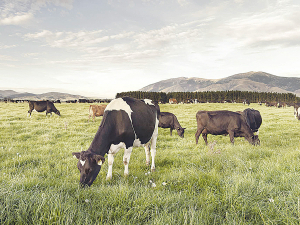NZ Catchment Groups Thrive with ‘Source to Sea’ Approach
The most successful catchment groups in NZ are those that have 'a source to sea' approach.
 Making any wholesale changes to the dairy farming system could end up having an overall detrimental effect, according to one academic.
Making any wholesale changes to the dairy farming system could end up having an overall detrimental effect, according to one academic.
Any farm system change should be farm by farm and not a wholesale change.
That’s the view of Dr Nick Sneddon, a senior lecturer in animal breeding at Massey University. He’s also worked as a business analyst at Fonterra.
Making any wholesale changes to the dairy farming system in NZ could end up having an overall detrimental effect, but Sneddon believes that individual farmers should closely examine their balance sheets and assess what cost cutting makes sense for them.
“For example, cutting out nitrogen might be viable on one farm but not on another, while reducing supplementary feed may work for one and not another,” he says.
Sneddon says the industry is going through another cycle of depressed prices for milk but he points out there have also been good times.
He says during the good times, the increased on-farm costs effectively get masked by the higher prices, but when incomes fall, the costs are exposed. He says the increased costs of bigticket items such as fertiliser and supplements have added another 60c/ kgMS to farmers’ costs. He adds that interest rates are also adding to the woes of farmers.
Sneddon says when it comes to cost cutting there are various tradeoffs. Once-a-day (OAD) milking is an option for some but again not for others.
“You can drop feed out but you can only do that if you reduce the number of animals you have to feed. You can’t remove nitrogen and expect to grow more grass.
“So, it’s possible looking at the cows at the bottom of herd and saying, who’s ready to go – namely those with low genetic merit or low production or repeat mastitis cows – and that can reduce that feed bill,” he says.
But Sneddon says care should be taken to keep young cows of high genetic merit that may not be the highest producers in the herd now but will be in the future.
“The ones to target are the older cows who are producing less,” he says.
Sneddon says the use of data is important to make the correct decisions. He says often farmers generate useful data but don’t realise it is available to them. He says they should not only look at recently generated information but also what milk production was three years ago at the same time of the year.
The Meat Industry Association of New Zealand (MIA) today announced that Chief Executive Officer Sirma Karapeeva has resigned from the role.
The winners of the 2026 Hawke’s Bay/Wairarapa Dairy Industry Awards were announced at the annual awards dinner held at Copthorne Solway Park in Masterton on Thursday evening.
Environment Southland is welcoming this week’s decision by the Environmental Protection Authority (EPA) to approve the release of Blaptea elguetai, a leaf‑feeding beetle that will help control the highly invasive Chilean flame creeper.
This March, the potato industry is proudly celebrating International Women’s Day on 8 March alongside the International Year of the Woman Farmer, recognising the vital role women play across every part of the sector — from paddocks and packhouses to research, leadership, and innovation.
Fruit trader Seeka posted a record profit and returns to shareholders in 2025.
Recent weather events in the Bay of Plenty, Gisborne/Tairawhiti, and Canterbury have been declared a medium-scale adverse event.
OPINION: Staying with politics, with less than nine months to go before the general elections, there’s confusion in the Labour…
OPINION: Winston Peters' tirade against the free trade deal stitched with India may not be all political posturing by the…